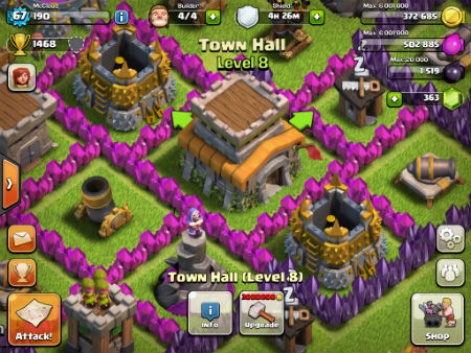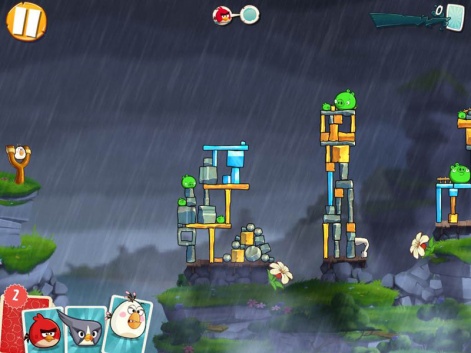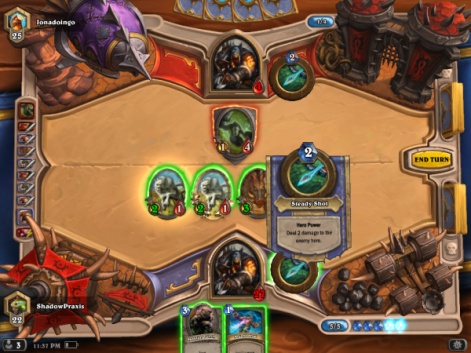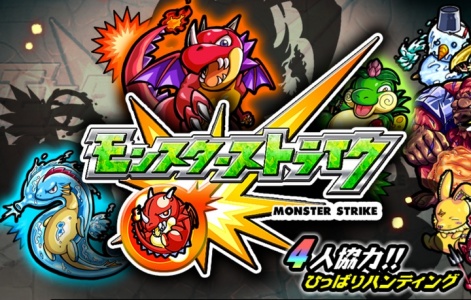There have been a number of mobile games that have generated $1 billion in lifetime revenues.
GungHo's Puzzle & Dragons was the first, closely followed by King's Candy Crush Saga.
But are our ambitions too low.
Recently, Neil Young (previously CEO of ngmoco/DeNA West and now with his startup N3TWORK) has been talking about the inevitability of the $10 billion mobile game franchise.
So, we asked our Mavens:
- Do you agree and what do you think a $10 billion mobile game franchise would look/play like?

Oscar Clark has been a pioneer in online, mobile, and console social games services since 1998. He is also author of the book, Games As A Service – How Free To Play Design Can Make Better Games.
I happen to agree with the premise, but I fear we are a long way from delivering it.
The clues to building the $10 billion game lies within the three currently dominant models of the most successful games.
First - we have the enormous reach of the top 10 mobile games like Clash of Clans and Candy Crush. This reach is as Neil describes, partly due to the compelling repetitive forms of play which bring players back for short regular sessions, as well as their ability to sustain that interest over years, not just days.

Then there is continued power of the triple-A brands like Call of Duty or GTA, which create events out of their release as much as they inspire and deliver delight because of the attention to detail and sheer scale of the technical achievement.
However, ironically, their approach to marketing and building a brand I suspect is even more important and its something we are seeing increasingly come into mobile marketing.
Direct Response or performance marketing which is ubiquitous in mobile games and hugely effective in building reach is important, but arguably we have undervalued the 'less measurable' brand building marketing not least as it's harder to prove its direct contribution to sales.
Long term engagement in games like Puzzle & Dragons is incredible.Oscar Clark
But brand building isn't something you can measure on a daily basis. It's something which builds up over time and takes nurturing. The big triple-A titles have been exceptional at building up awareness, interest, desire and then action.
Finally, the biggest impact is a lesson we have to learn from the East. Long term engagement in games like Puzzle & Dragons, Legend of the Cryptids or even Rage of Bahamut is incredible.
Look at the App Annie charts for these games. They remain top rated 'grossing' games long after their position in the download charts has disappeared into insignificance. This is because rather than focusing on just ratcheting up the revenue from players over their lifecycle, they actively create predictable value for coming back over days, weeks, months and years.
Creating loops events which match the lifestyle of players who can predict their ongoing value. That's amazing.
So it should be as easy as taking the best aspects of each of these models and building something from that. However, this is no simple task
Mobile games tend to scale based on simplicity rather than the complexity needed to sustain interest over extended time. It would take a hugely determined designer to move away from a working design generating profits today to take it towards the more complex systems needed for the possibility of longer term retention.
Triple-A games that can command $60+ upfront payments will continue to struggle to move towards a service model and their focus on dedicated hardware will continue to limit the opportunities to scale and hence their understandable reticence to move fully to a freemium model.

The Asian-focused design of the collectable card-style mobile game genre this has lead to a light social mechanic, which although hugely effective has yet to really have the same impact on Western audiences. They have also failed to have the same gameplay or visual experiences which Western mechanics also depend.
Getting to the $10 billion franchise requires us to shift from a game to an entertainment lifestyle.Oscar Clark
More than this I suspect getting to the $10 billion franchise requires us to shift from a game to an entertainment lifestyle. This won't be limited to mobile it will be a game 'world' which leverages the best experiences of each of the devices our players have already.
Play which equally but differently benefits from decisions made on our smart watches in a few seconds, a couple of minutes of play on our phones, or short sessions on our tablets but still have variations of play which suit our desire to escape from reality for a few hours on our PCs or consoles.
This isn't about one game. This is a collection of experiences which suit us and allow us to build communities in new, truly social, worlds of our imagination.
Every single aspect of design for our $10 billion game has to be laser focused on each individual form it's delivered to. It requires huge commitment to establish and each element individually has the curse of the hit driven market that is games. I simply don't think anyone is there yet.
But give me a $ billion development budget and $ billion for marketing and I'm sure I'd find a way ;0)
Agree with Oscar on the multi platform specialization and domination approach.
Gaming needs a Nick Fury: the Avengers of each delivery method need to assemble in some form of supergroup and save the world from impending doom.
A 10 billion dollar title is inevitable and it will not be much different from the current contenders.
However, let's hope for a little more effort from the usual suspects, as there has been very little visual evolution.
I do think that a VR component will be needed.

A games programmer before joining Sony’s early PlayStation team in 1994, he then founded developer Pure Entertainment, which IPO’d and launched a free-to-play online gaming service way back in 1999.
He was also a director of pioneering motion gaming startup In2Games, which was sold to a US group in 2008.
Along the way, he’s been a corporate VP, troubleshooter, and non-exec to a variety of companies and investors in and around the games sector.
Harry was European CEO of Marvelous AQL, a Japanese developer and publisher of social, mobile and console games, known for console games like No More Heroes and Harvest Moon, but now highly successful in the free-to-play mobile and web space in Japan and Asia.
Harry is CEO of Magicave.
I also echo Oscar's comments, particularly on the need to look east for inspiration.
I don't believe that the high LTVs in Japan suggest any particular propensity for Japanese players to spend more, other than that they've been doing it a long time, and are more used to it.
The secret is in the Japanese developers making games that engage players for years rather than days.Harry Holwood
The secret is in the Japanese developers making games that engage players for years rather than days, and they're doing that because they've come from a background of making compelling social network games from the featurephone days, which didn't happen in the west.
I feel I should take the opportunity to plug The Secret Police, a new London-based mobile studio I'm involved in, who are combining Japanese-style metagame systems with western-friendly gameplay, polish and UI.
Japanese games have often failed to replicate their success in the west as they confuse players - making, as they do, assumptions about our understanding of collection, gacha, fusion and battle systems - which may be familiar to Japanese users, but are new to most of us.
As the industry matures, I fully expect to see LTVs in the west approaching those seen in Japan.
Apply those kind of KPIs to a global audience, rather than a single country, and we can see the mobile gaming market of the future accommodating the $10 billion titles Neil referred to in his presentation.

Sports and Action Sports games related with Brands have been his mantra, having worked at Biodroid for 7 years he had the opportunity to develop Skate, BMX, Surf, Olympics and football games.
Early in 2015, he started his own Studio, B5 Studios, a real mix approach to game dev from truly indie games to physical/hardware interaction experiences that combine mobile with external interfaces because games are made to make people happy.
I would center on the marketing side. Global marketing makes you go mainstream and focus on product. Right now what we have on mainstream media are TV ads, sometimes on prime time but mostly out of peak.
As Oscar points out, building a product takes time and consumes a lot of resources. It makes you change from being a game developer to becoming a product manager and for that companies need big bucks just to push the start button, and even more bucks to continue pushing it.

With Angry Birds, Rovio went down the marketing mainstream highway. They paved a road that until now no other mobile gaming company has manage to repeat.
They pushed a game that is old by today standards of monetisation until they could and build a branding ecosystem around it. I’m curious to see how it will work for them with Angry Birds 2. Will they manage to capitalize on all their marketing efforts? I do hope so.
In this very thread we are hearing, "Japanese-style metagame will save us all!"
At the same time, metagame is not legally protectable, and, in this very thread, we are hearing, "We are going to do exactly what these other guys are doing when it comes to loops that engage players for the long term."
In this very thread we are hearing, Japanese-style metagame will save us all!.Scott Foe
The key to a $10 billion mobile title is going to be in the entertainment property development - legally protectable sounds, stories, symbols, characters, and themes.
Summoners War is great, but would a Summoners War movie be great?
Entertainment property development is at the heart of building asset value for any games content organization.
Name the mobile game studios that have solid entertainment property development strategies: those studios are where you're going to find your ten billion dollar franchise(s).
Those studios, or when inflation makes all franchises ten billion dollar franchises. I wonder which will come first?
If Nintendo decided to go all-in with a Mario on mobile, it could be a $10 billion mobile game.
I agree that one of the triple-A franchises could also be that $10 billion.

Tony’s career has covered the whole spectrum from AAA console to handheld, mobile and flash titles, working on huge franchises such as Grand Theft Auto, Red Dead Redemption, and Call of Duty.
In 2015 he founded Ant Workshop to develop his own titles and to offer his experience as a design consultant.
Don’t even think it needs to be Mario. I think something like Pokemon has the brand awareness and pulling power, and a structure that would very much suit a F2P game.
There’s so much elder game content in the series already in terms of breeding, competitions, and PvP.
Obviously it’d need a deft touch since it’s very easy to mess up something like this by being aggressive on monetisation or by accidentally turning it in to a pay-to-win game.
Imagine how game breaking it’d be if they charged for Pokeballs!
A game like Hearthstone could become a very, very large property. It has mass appeal, casual and hardcore mechanics, luck and chance, and piggy backs on the largest MMO franchise in history.
The competitive scene surrounding the game has been crazy. It has gone from 20 person tournaments during the alpha (which started on iPad and PC only), to an NVIDIA PROAM tournament with 1000s of players over a month of matches.

The big lesson is accessibility of the game.
Mobile is a vehicle, but when the experience can be the same over multiple landscapes it has the probability to be wildly accepted for all.

Shanti Bergel brings a career-long passion for Web and mobile entrepreneurship to his role as Senior Vice President of Business & Corporate Development at GREE.
Building upon 20 years of experience, he is recognized as an expert on freemium monetization and digital distribution.
Prior to joining GREE, Shanti oversaw publishing, international expansion, monetization, and corporate development at social game developer Playfish.
He also led business development at Three Rings, an early pioneer in free-to-play MMOs, and ran console, PC, mobile, online, and casual game development for The Sims and FIFA at Electronic Arts.
Shanti is now General Partner at Transcend.
His global operating experience spans every major platform and business model transition of the last several decades and is animated by a career-long fascination with how changes in technology and distribution affect products, services, and communities.
As an investor, Shanti is proud to work alongside some of the most ambitious and talented founders in the business. He is a recognized member of the Techcrunch List, speaks fluent Japanese, and is a frequent speaker on early stage investment, M&A, and strategic partnerships in digital entertainment.
Every generation of smartphone mobile games has been longer lived and better monetizing than the last.Shanti Bergel
As the install base for and ecosystem around mobile continue to grow and mature, we should definitely see the emergence of a $10 billion mobile game franchise.
While the backdrop is of course an unforgiving power law revenue distribution curve, as a whole every generation of smartphone mobile games has been longer lived and better monetizing than the last.
This trend will continue. In comparison to more mature free-to-play markets like Asian PC MMOs, the Western mobile gaming market is still early in its adoption curve of free-to-play best practices.
For those at the top end of the scale, there continues to be considerable headroom in the existing business before even factoring in potential multipliers like eSports, cross-platform, etc.

Oscar Clark has been a pioneer in online, mobile, and console social games services since 1998. He is also author of the book, Games As A Service – How Free To Play Design Can Make Better Games.
Shanti makes a good point about how relatively immature the F2P model is in the west and we should be concerned that its initial success could stagnate (rather than rise) if we fail to adopt more sustainable approaches to IAP.
We have to make sure the power to create effectively monetising gameplay is lead by creative designers informed by data, not 'monetisation' specialists.
This isn't wishful thinking or any kind of altruism its a basic business principle. Its the first rule of marketing: "Identify and Satisfy Consumer Needs".
You won't reach $1 billion without creating consumer value.
I talked about this in more detail on the Unity Blog site which includes a link to the recording of webinar I gave recently.

John is co-founder of PR and marketing company Big Ideas Machine. Also an all-round nice guy...
While I agree that there's certainly potential for mobile to produce increasingly successful games, $10 billion is a hell of a big number.
I'm with Scott that it's all well and good to hypothesise about what a $10 billion game might look like, far harder to actually create one. And are we talking $10 billion in profit or just revenue?
The way things currently look in mobile, any game that brings in $10 billion revenue will have cost $9 billion in UA.John Ozimek
Because the way things currently look in mobile, any game that brings in $10 billion revenue will have cost $9 billion in UA.
There are only a handful of game franchises that have passed that kind of number, and it's taken years of exceptional execution, great IP, and huge fan engagement to get there.
I'm thinking Call of Duty, World of Warcraft, GTA, Mario, Space Invaders, Pokemon... maybe once you add the films and merchandise.
Building multi-game franchises is the biggest challenge facing mobile, as even the most successful games so far have largely been one-offs, and the top-grossing games have all suffered from the dreaded second album syndrome.
So yes, I can imagine there being a handful of mobile games that generate this kind of revenue, but I don't see them arriving as soon as we imagine.

Tony’s career has covered the whole spectrum from AAA console to handheld, mobile and flash titles, working on huge franchises such as Grand Theft Auto, Red Dead Redemption, and Call of Duty.
In 2015 he founded Ant Workshop to develop his own titles and to offer his experience as a design consultant.
Isn’t the second album thing a bit of a Games-as-a-Service issue though (and most of the super-successful mobile games have been this model)?
Again, it’d need an incredibly deft touch to persuade a userbase of super fans who’ve spent thousands in the first game that they should move to Clash of Clans 2: Clash Harder.

Oscar Clark has been a pioneer in online, mobile, and console social games services since 1998. He is also author of the book, Games As A Service – How Free To Play Design Can Make Better Games.
Tony’s is right and there are very few examples where this has been done well.
But I think there are external examples of approaches which we could take such as World of Warcraft’s strategy of announcing big new content releases (albeit as paid updates and arguably with too long between them) worked for a while.
Key to this success was making the releases predictable and obviously momentous and this also arguably assisted retention even for those players who didn’t buy the update.
There could be freemium applications of this strategy. Tell people what you are going to do in three months, tell them you are about to release it, tell them how great it was and why the next one in the next three months will be just as good if not even better.
Again its something that the Japanese collectable battler games have taken one step further with independent daily, weekly, monthly and thee monthly release/event cycles.

John is co-founder of PR and marketing company Big Ideas Machine. Also an all-round nice guy...
But isn't that the point? Yes, GaaS will undoubtably create monstrously successful games, but to become a $10 billion property the scope arguably needs to be wider than just the game itself - it's about creating a universe within which different kinds of gamers (or non-gamers) can connect with a brand.
Look at what Acivistion/Bungie is attempting with Destiny - it's absolutely a GaaS model, but even within that there are planned 'sequels' to allow new players to enter the game universe without having to start at the very beginning.
It is also a very important part of the hype cycle, to offer the promise of a 'new and improved' version of something you already love.
The Simpsons summed this up pretty well...

Jon Hare is one of Europe's best known creative directors and game designers with over 10 international number one games to his name and nearly 30 years of experience in the games industry.
Jon co-founded and managed the legendary 1980/90s development company Sensible Software, creating games such as Sensible Soccer, Cannon Fodder and Wizball to great critical acclaim and commercial success and has also worked in senior posts in two of the UK's biggest games developer/publishers Codemasters and Jagex.
Since 1999 Jon has been one of the top game design and business development consultants in Europe working for many different publishing and development clients.
His own new company Tower Studios specializes in developing, publishing and licensing games on mobile and digital formats enjoying recent international success with the release of Speedball 2 Evolution and Word Explorer across numerous mobile and digital platforms.
Jon has also been a full BAFTA member for over 10 years, serving on the BAFTA Games Committee and is a regular Chairman of juries for BAFTA Games awards, as well as acting in a mentor capacity for both BAFTA and NESTA.
The problem is that, in the mobile gaming world, no-one can build their label in the mass market except Apple, Google, Amazon et all.
By my calculations, the international mobile development community lost about $1.9 billion last year.Jon Hare
That Rovio, King and Supercell have all struggled in recent years to back up their excellent successes is down to the fact that, unlike console platforms, the digital behemoths do virtually nothing to support their best publishers and developers within the ridiculous and unwieldy monster of a market place that they have accidentally found themselves custodians of.
Furthermore mobile games have never been seen as art, therefore there is no "artist" to follow.
Forget the $10 billion revenue... by my calculations the international mobile development community lost about $1.9 billion last year in terms of costs exceeding income... and that is without factoring in marketing spend.
As professional developers and publishers we are meant to be businessmen and if our business is making too big a loss we are meant to quit while we are relatively ahead and look elsewhere.

Since founding Tag Games in 2006 Paul has built the studio from humble beginnings to become one of the most respected and successful mobile and handheld developers in Europe.
He began a long, and some might say, distinguished, games industry career at legendary developer DMA Design, playing a key role in the development of the GTA series
“As professional developers and publishers we are meant to be businessmen and if our business is making too big a loss we are meant to quit while we are relatively ahead and look elsewhere.”
Unless we’re either doing it for the love of the journey/creative process/people, or we’re mad…
I get the sense that most of us are the former with a little of the later sprinkled in for good measure!
To achieve a $10 billion mobile game franchise I think the following would have to occur:
- Creation of a hugely powerful (‘Star Wars big’) IP with broad demographic and geographic appeal.
- An IP that works for games, TV/film, fashion, toys, advertisers, books/comics and more.
- An IP can be used across a family of games in sequence and in parallel (like Marvel does for film)
- An IP that appeals equally in the East and the West, to both genders, to a broad age range and to a fans of many game genres.
- IP and gameplay that is perfectly suited to multiple sequels.
- Availability on all platforms and stores.
- Exceptional technical and creative execution.
- Brand reach that delivers a high percentage of viral and organic users across multiple media channels (not just paid in-app ads)
- Gameplay that works (exceptionally well) in the East and West and which keeps players coming back for 12+ months.
- Monetisation approaches that work in all major global markets and in an extended/sustained way.
- Monetisation that converts much, much more than 1-3% of player base (more like 15-25%)
- 5-10 years to build it all.
- An incredible amount of funding support.
- A lot of luck
I remain sceptical!
Candy Crush has made more than $1.3 billion as of February so $10 billion is totally doable without TV, movies, magical IP etc.
It might not be right around the corner, but it will happen in the next generation of breakout hits.
Candy Crush made $546 million in Q4 2014 and has had more than two and a half years of longevity. Clash of Clans has made $1.7 billion in 2014 alone and has had more than 3 years of longevity.
Both Candy Crush and Clash of Clans will decline before they hit $10 billion but there will eventually be apps that take over their spot.Dave Castelnuovo
I think both Candy Crush and Clash of Clans will decline before they hit $10 billion but there will eventually be apps that take over their spot in the limelight and hit that goal.
It's not unreasonable for that app to have both longer longevity and make more money per quarter (they would likely be starting at $500 million/quarter and grow over time).
An app would need 5 years at that pace to hit $10 billion but likely it would only need 3 years if they can hit $1 billion per quarter.
Although this is really dependent on whether the mobile game industry will grow or stagnate which is impossible to predict. It seems like a safe bet that things will continue to grow but we don't know whether people will get tired of the freemium formula.
The current environment is pro break out hit but another scenario would be that the market still grows but with greater fragmentation making mega hits a lot less likely. This could happen if app discovery all of a sudden becomes really good.
But even if these two scenarios take place, there is nothing in the gaming industry that is going to supplant mobile games in the far future, I just don't see people shifting their money back to consoles from mobile. Mobile is just too personal and convenient. If anything, publishers will find a way to bring the magic of a Call of Duty or World of Warcraft to the mobile platform.
Tomorrow's success might not fit the pattern of today's success but humans are smart, I'm sure we will find ways to part players from their money in ever more efficient ways.

Jon Hare is one of Europe's best known creative directors and game designers with over 10 international number one games to his name and nearly 30 years of experience in the games industry.
Jon co-founded and managed the legendary 1980/90s development company Sensible Software, creating games such as Sensible Soccer, Cannon Fodder and Wizball to great critical acclaim and commercial success and has also worked in senior posts in two of the UK's biggest games developer/publishers Codemasters and Jagex.
Since 1999 Jon has been one of the top game design and business development consultants in Europe working for many different publishing and development clients.
His own new company Tower Studios specializes in developing, publishing and licensing games on mobile and digital formats enjoying recent international success with the release of Speedball 2 Evolution and Word Explorer across numerous mobile and digital platforms.
Jon has also been a full BAFTA member for over 10 years, serving on the BAFTA Games Committee and is a regular Chairman of juries for BAFTA Games awards, as well as acting in a mentor capacity for both BAFTA and NESTA.
The real focus should be on avoiding today’s failure, not trying to emulate and exceed today’s very few successes.
I am absolutely astounded how many people talk about game development like they are spending someone else’s time and money.
- the Gold Rush is over...
- the Space Race is now on....
You will need more than just shovels to make your mark boys.
Not sure what you mean, or even if it was directed at my response.
We are talking about whether a game will come along that makes $10 billion. Of course it will.
It’s a completely different topic concerning what we do as individuals to make our own way in the industry, or what the industry needs to do to allow for a greater spread of success.
We are all trying to do what we can to make a living making games and along the way hope to make a lot of money doing what we love.
If I were giving someone advice on what they need to do. I would say think smaller, think niche. It’s a fool’s errand to attempt to be the next Candy Crush.
Nonetheless, the next Candy Crush will eventually come around and be bigger than its predecessor.

Jon Hare is one of Europe's best known creative directors and game designers with over 10 international number one games to his name and nearly 30 years of experience in the games industry.
Jon co-founded and managed the legendary 1980/90s development company Sensible Software, creating games such as Sensible Soccer, Cannon Fodder and Wizball to great critical acclaim and commercial success and has also worked in senior posts in two of the UK's biggest games developer/publishers Codemasters and Jagex.
Since 1999 Jon has been one of the top game design and business development consultants in Europe working for many different publishing and development clients.
His own new company Tower Studios specializes in developing, publishing and licensing games on mobile and digital formats enjoying recent international success with the release of Speedball 2 Evolution and Word Explorer across numerous mobile and digital platforms.
Jon has also been a full BAFTA member for over 10 years, serving on the BAFTA Games Committee and is a regular Chairman of juries for BAFTA Games awards, as well as acting in a mentor capacity for both BAFTA and NESTA.
Hi Dave
In that case for sure you are right, eventually someone will hit the $10 billion jackpot and I am sure a few will fail trying beforehand.
And I am a lot more comfortable when some realistic subtext, as you have just added, is set alongside the proposition.
Maybe I am acting like the Grinch, but to me a sense of realism and perspective must be communicated at all times, as none of us is likely to hit the $1 billion prize any time soon, let alone the $10 billion one.
I'm not qualified to say if a $10 billion mobile game is likely, but I know we've not seen the last hit.
Because of that I'd much rather repeatedly fail to build a game of financial and cultural significance than never try.
I think it’s worth pointing out that there are many different ways to succeed. And even if you are doing something that seems against the grain of the industry, who knows whether you are about to stumble upon a new avenue to success.
In these types of conversations it seems hard to talk about these different paths without feeling like it has some ability to change your course of action. Like talking about a company’s mega success means you have to drop everything and try to be a mega success.
History has shown time and again that nothing is forever, things change, what works today may not work tomorrow.Dave Castelnuovo
Business and development strategy is something that is personal and unique to each of us. And although there might be trends, there is no correct answer.
History has shown time and again that nothing is forever, things change, what works today may not work tomorrow. What works for one team may not work for your team. And we want it like this, in order to have a vibrant ecosystem, we need variety in how we approach the same problem.
To anyone out there reading these articles, do what’s right for you. Just because you read something that has a different perspective doesn’t mean it devalues your approach.
Use what’s useful and throw the rest out. At the same time don’t shy away from finding value in a different strategy just because it runs counter to your own. There really is more than one answer to something as complex as finding success in the game industry. Just because you acknowledge a competing viewpoint doesn’t mean that view point needs to be your new strategy.
And keep in mind that none of us has cracked the code, some of us have found varying degrees of success and many of us are very opinionated.
But last time I checked there are zero dev teams that knock it out of the park with every single game they make. Even King and Supercell are having a tough time releasing follow ups that are just as successful as their original hit games.

Since founding Tag Games in 2006 Paul has built the studio from humble beginnings to become one of the most respected and successful mobile and handheld developers in Europe.
He began a long, and some might say, distinguished, games industry career at legendary developer DMA Design, playing a key role in the development of the GTA series
Great post Dave. I don't often agree with everything someone posts on this thread, but that's hit the mark!
It's also worth pointing out that for some people $10 billion wouldn't be enough success - especially if we are defining success on other terms than financial.
How very post-modern/post-capitalist of us!

A games programmer before joining Sony’s early PlayStation team in 1994, he then founded developer Pure Entertainment, which IPO’d and launched a free-to-play online gaming service way back in 1999.
He was also a director of pioneering motion gaming startup In2Games, which was sold to a US group in 2008.
Along the way, he’s been a corporate VP, troubleshooter, and non-exec to a variety of companies and investors in and around the games sector.
Harry was European CEO of Marvelous AQL, a Japanese developer and publisher of social, mobile and console games, known for console games like No More Heroes and Harvest Moon, but now highly successful in the free-to-play mobile and web space in Japan and Asia.
Harry is CEO of Magicave.
I'm sure making a $10 billion game is a difficult call, but a quick Google for some numbers puts some perspective on it:
- Monster Strike apparently makes $3.8 million a day, and has had 'only' 25 million downloads (c/o Serkan Toto's excellent blog)
- Candy Crush Saga has had over a billion downloads
Different games, audiences etc so the comparison isn't overly valid but, if Candy Crush, with 40 times the audience of Monster Strike, monetized like Monster Strike, it would make 40*3.8m per day = $152 million per day.

At that rate it would generate $10 billion in 66 days.
Could such a game exist? Probably not, but if this hypothetical game could do it in two months, I daresay a real one could do it in a couple of years.

Oscar Clark has been a pioneer in online, mobile, and console social games services since 1998. He is also author of the book, Games As A Service – How Free To Play Design Can Make Better Games.
And just to build on what I think Dave is saying, it would be to our impoverishment as an industry if every developers focus was to become a $10 billion game.
Such larger scale games are arguably by definition mass market commodity experiences. They have to appeal to such huge variations of people that there is the risk of dumbing down. The Star Wars Preludes being an example in movies in my opinion.
What's probably even more fascinating is that unlike film there remains scope for successful games of every scale in our ecosystem now. Partly because of the vast reach of mobile devices but also because of our vastly varied use of almost every computing device to play.
In this way games share something with music more than film, every new artist brings something to the wider experience and enriches us all. Film’s over emphasis on the triple-A (much like our own until recent years) has left us often ignoring important independent short films where magical things can still happen.
We won't be a richer industry for having a $10 billion game franchise if this doesn't help us retain the whole spectrum of games talent and experience.






























